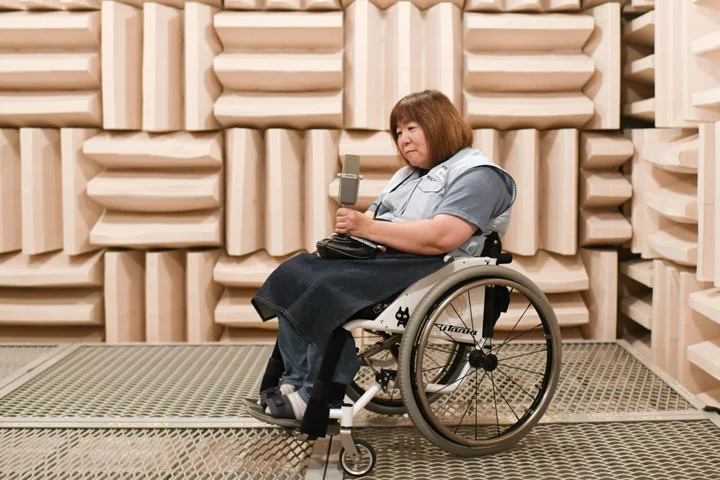Eiko Higuchi took a job in an audio factory employing people with disabilities after an accident left her needing to use a wheelchair. Thirty-five years later, she’s become a master craftswoman, making microphones for recording industry stars like Dr. Dre.
Higuchi works for a Sony Group Corp. subsidiary, in a plant designed to give people with disabilities a fair chance in the workplace. It’s the passion project of co-founder Masaru Ibuka, who created the unit Sony Taiyo to disprove widespread prejudice about disabled people in Japan.
To accommodate workers with different physical challenges, Sony developed a unique approach to the factory floor. Instead of conveyor-belt systems and one-size-fits-all work benches, the company turned to what it calls cellular manufacturing. With many of the products made at Taiyo, it entrusts the entire process to a single person who handles production from raw parts to packaging at a customized work station with all tools within easy reach.
The shift has proven beneficial for the finished product, as audio gear has countless analog parts that require fine-tuning and sensitivity that mass-manufacturing techniques lack.
Higuchi specializes in the $2,900 C-38B microphone, first introduced in 1965, and says that simply assembling its components would not be enough to reproduce the original, six-decade-old sound that broadcasters and musicians are listening out for.
“Every tiny component has slight deviations in texture, color and weight, and needs to be adjusted by hand. Robots can’t take over my job,” Higuchi said in an interview.
Taiyo’s revenues tripled when it adopted the cellular method in 1999, according to Sony. Beside the C-38B, the factory also makes Sony’s C-800G, an $11,000 microphone that’s now the gold standard for recording rap and pop vocals. Dr. Dre, Justin Bieber, Drake and David Gilmour are among its users documented on industry tracker Equipboard.
“The C-800G has become one of the most important parts of a contemporary vocal chain in pop, hip hop and R&B,” said Charlie Harding, host and producer of the Switched on Pop podcast. He and other producers say they expect to see the microphone in any serious recording studio.
“C-800G is a global standard that creators and engineers trust as it captures every little detailed vocal expression, on each note and breath, allowing us to convey emotion in our music in exactly the way we want,” said Taku Takahashi, a member of the Japanese hip-hop group M-Flo.
Higuchi builds base units for the C-800G, which are assembled by Taku Tanaka, who works at a bench nearby.
Both workers have been at Taiyo for over three decades, seeing the factory evolve and developing a passion for the job. Higuchi says she’s delighted to see her products in everything from TV commercials to music and YouTube videos and finds deep satisfaction in a job where she’s personally responsible for the entire product rather than just a step in its assembly.
“When I joined, it was two conveyor lines making thousands of Walkmans per day,” 55-year-old Higuchi said. “Going to the restroom wasn’t easy because of the conveyor system, but as the factory adopted its cell system, we can now work at our own pace and take breaks at our discretion.”
Sony, once a consumer electronics titan with globally recognized brands like Trinitron, Walkman and VAIO, lost momentum in the smartphone age and has narrowed its hardware lineup to more specialized equipment. That includes its Alpha enthusiast camera lineup and professional audio gear built at Taiyo, such as the made-to-order Just ear earbuds and the MDR-CD900ST studio-monitoring headphones.
Audio gear manufacturing may be uniquely suited to the cellular method of work. Sony deliberately sought out a segment of electronics production that didn’t cycle through product iterations often and required close attention and quality control. Outside of Sony, audiophile hardware makers like Audeze LLC and Dan Clark Audio, both based in California, keep manufacturing small scale and in-house to ensure consistent quality of the final product, their founders said.
At Taiyo, a single craft master with a meticulous eye goes through each step of hand-assembly, testing and finishing. It’s more akin to fine watchmaking than mass-market electronics.
Of the 190 staff at Taiyo, roughly 60% have a disability. For most people with disabilities in Japan, employment options are limited, even as companies comply with government regulations for more inclusive hiring. Salaries at Taiyo average close to ¥4 million ($27,300), according to staffing company Persol. That’s in line with manufacturing factories across Japan and the typical pay for such work in the region.
Higuchi is among a cadre of long-tenured engineers at Taiyo who are designated monozukuri — or production — masters and help train apprentices. That cycle of expertise helps Taiyo produce Sony’s most-esteemed audio products and also yields manufacturing insights that the company deploys more widely, according to factory chief Fumitaka Nishijima.
“It’s not just Taiyo where Sony employs people with disabilities, but we’ve done it for a long time and create ideal work models for others to follow,” Nishijima said. “Even when making factories more automated, our knowledge is useful because customizing a work cell for each employee is quite similar to the steps required for installing robots in plants.”
--With assistance from Kurumi Mori.

